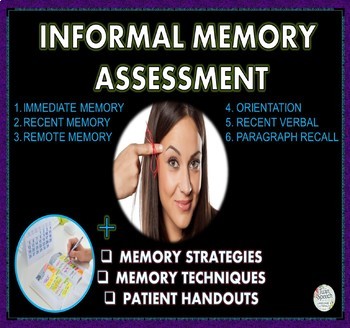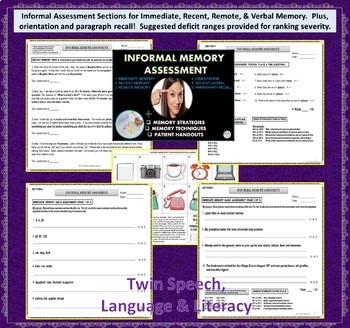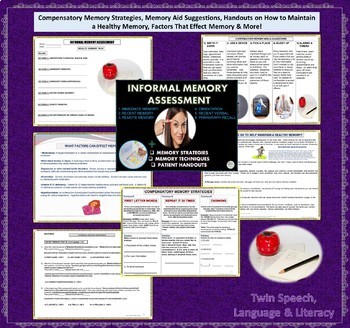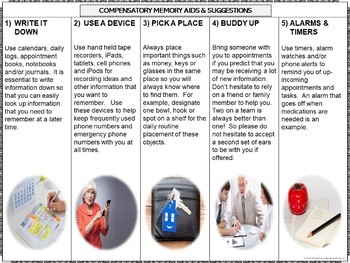MEMORY UNIT: Informal Memory Assessment, Memory Strategies & Techniques
- PDF
Description
Today we would like to tell you about our newly developed Memory Unit for informally assessing memory skills, for educating patients and caregivers about how to help improve memory and factors that effect memory. It also helps to teach compensatory memory strategies and introduces people to a wide range of compensatory memory aids.
This resource is perfect for your cognitive therapy tool box!
Why assess and treat memory? Maybe the client has always had trouble remembering things and the reason why is uncertain. If a student has a hard time learning at school, attention to task and memory loss can sometimes be the explanation of why it is hard for them to learn new material. Or, maybe a student or older client has recently suffered a concussion or mild TBI (traumatic brain injury). Just as serious, perhaps they have had a change in their cognitive status due to a stroke, a tumor to the brain/cancer or neurological disease such as MS (Multiple Sclerosis)?
We hope that this informal assessment will give you a good pre-therapy informational base on how your client is doing in the areas of immediate memory, orientation to person, place and time, remote memory, recent memory (past 10 minutes of delay), verbal memory and immediate paragraph recall. After practicing the compensatory memory strategies, teaching the client about compensatory memory aids and conducting other cognitive and short-term memory exercises that are presented in cognitive-based therapy, the informal assessment within this unit can be re-given to assess discharge status of memory skills.
We truly feel as if this unit will provide you with some essential data on how well your client is doing in several memory skills areas. It will also provide you with some very useful handouts and worksheets for your clients that need to work on developing their memory skills.
The handouts are most appropriate for the older student in high school and all other adult populations.
Below you will find a description of the contents of this unit. Please read the contents and also take a look at the preview to see example pages.
Page 3: Recent Memory Assessment Part A: Information for later recall page. Complete the four tasks with the client prior to completing the other sections of The Informal Memory Assessment. Record the time that each task was presented. After at least ten minutes, present the questions from Recent Memory Part B: Scoring page with the client to assess their recall of recently learned information after a 10 minute or more delay.
Page 4: Picture of Braydon Moss, the Accountant. Please print and laminate for repetitive use.
Page 5: Letter A Recent Memory Item Presentation Cards. Print out on index paper, or print out on regular printer paper, laminate and cut out the cards. Place the cards in a pile and face down on the table. A card deck labeling card is provided for storage.
Page 6: Letter B Recent Memory Item Recall Cards with the five new pictures. Print out on index paper, or print out on regular printer paper, laminate and cut out the cards. Place the cards in a pile after mixing them up face down on the table. A card deck labeling card is provided for storage.
Page 7: Orientation X3 Quick Assessment. Questions to informally assess person, place and time awareness.
Pages 8-9: Immediate Recall Quick Assessment Section. After asking the client to repeat the numbers, words and sentences, record the number of correctly repeated questions, obtain a percentage and client rating for immediate recall afterwards.
Pages 10-11: Paragraph Recall Quick Assessment Section and scoring page.
Pages 12-13: Recent Verbal Memory Quick Assessment Section and scoring page.
Page 14: Remote Memory Quick Assessment and scoring page.
Pages 15-16: Recent Memory Assessment Part B: Scoring page. Ask the client to recall the previously reviewed information after a ten or fifteen minutes. Next, record the results and score the clients recent memory skills using the client rating scale.
Pages 17: Informal Memory Assessment Results summary page.
Pages 18-21: Handouts on how to help improve memory, how to help maintain a healthy memory and what to expect from cognitive based speech therapy services that can be initiated to help a client suffering from memory loss.
Pages 22-23: Compensatory Memory Aids & Suggestions Handouts.
Pages 24-25: Compensatory Memory Strategies Handout. These handouts are also worksheets, as the client is able to practice each strategy.
Thank you so much for stopping by our Twin Speech, Language & Literacy TpT store today. We wish you all well and appreciate your support very much!
Sincerely,
Shanda Gaunt, M.S. CCC-SLP
Manda Riebel, M.A. CCC-SLP
Speech-Language Pathologists
Twin Speech, Language & Literacy LLC
Twin Speech, Language & Literacy LLC at Facebook
Unless someone like you cares a whole awful lot, nothing is going to get better. It's not. ~Dr. Seuss





